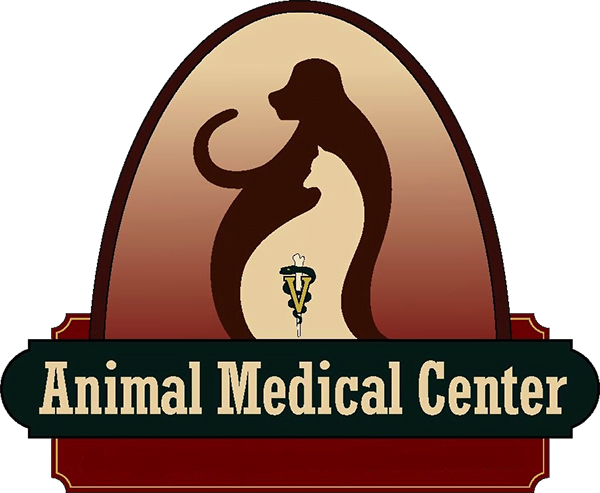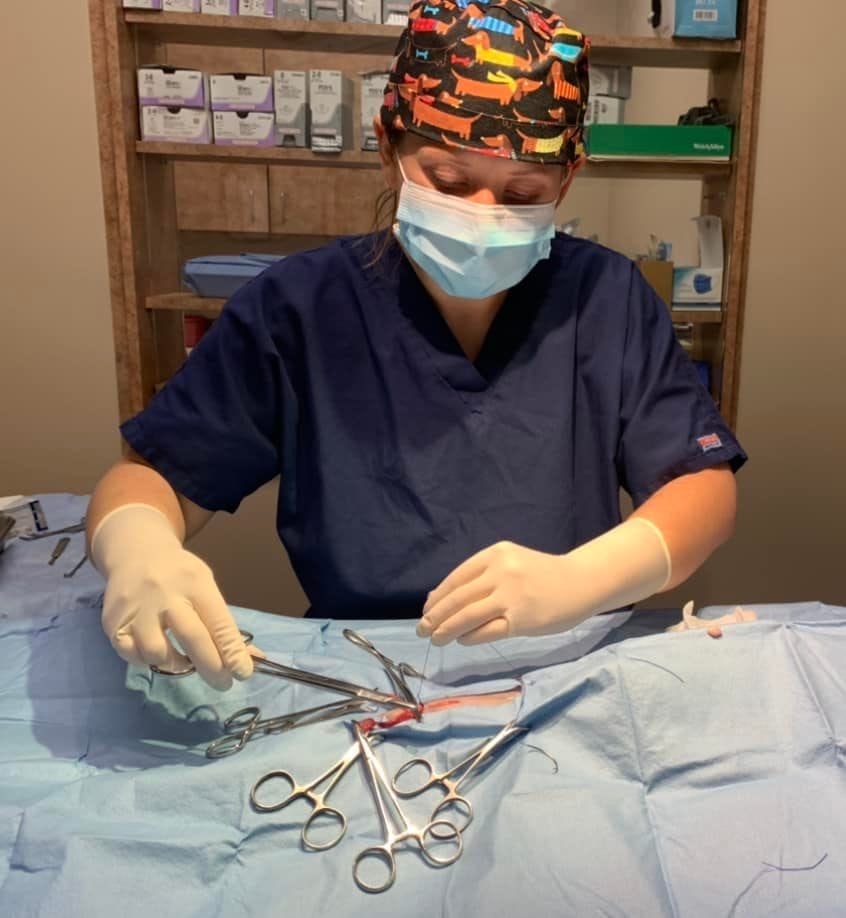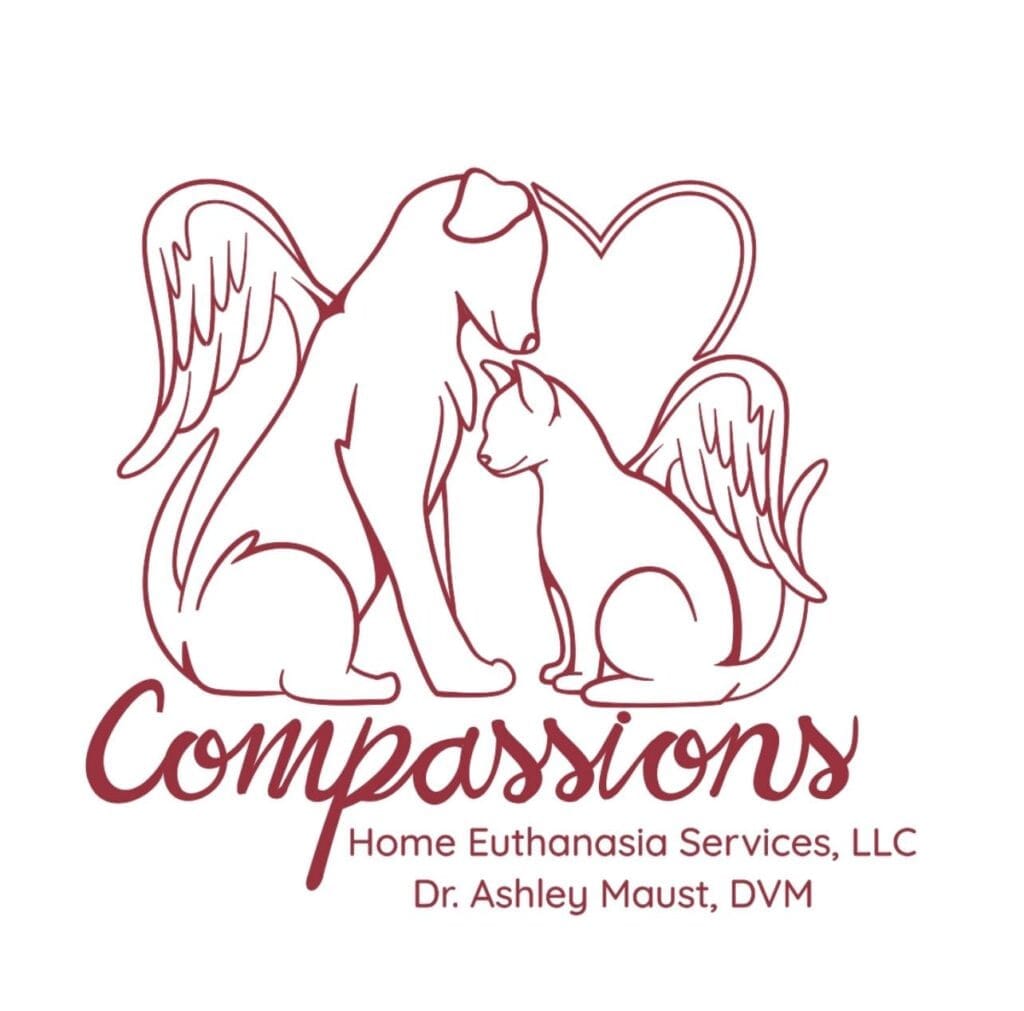![]()
Services
Animal Medical Center offers a wide range of veterinary services for our patients. Just a few of our wellness and preventive care services are listed below. For more information on these or other services, please call 814-443-6979.
- Puppy and Kitten Care
- Wellness Care
- Senior Pet Care
- Parasite Control
- Pet Dental Care
- Diagnostic Care
- Vaccinations
- In-House Laboratory
- Surgery & Related Services
- Pain Management
- End of Life Care
- Referrals
Getting your new puppy or kitten off to a healthy start sets the stage for their lives as healthy adults. Regular physical examinations, core and elective vaccinations, fecal testing for parasites, and deworming are all important elements of ensuring good health for your puppy or kitten. Our knowledgeable staff can help your family learn about potty training your pup, performing nail trims on your puppy or kitten, dietary recommendations, and potential health hazards for your new pet.
Spaying and neutering are additional topics to consider; the appropriate age for the timing of sterilization surgery may vary upon the species and breed of your pet. You may also want to consider Pet Health Insurance – a great way to get your new little family member off to a good start. Last but not least, you’ll also want to consider whether your new puppy or kitten may need preventives such as monthly heartworm prevention, and flea/tick preventives. We realize that adding a new family pet can come with lots of questions… but don’t forget, we’re here to help, so please don’t hesitate to call.
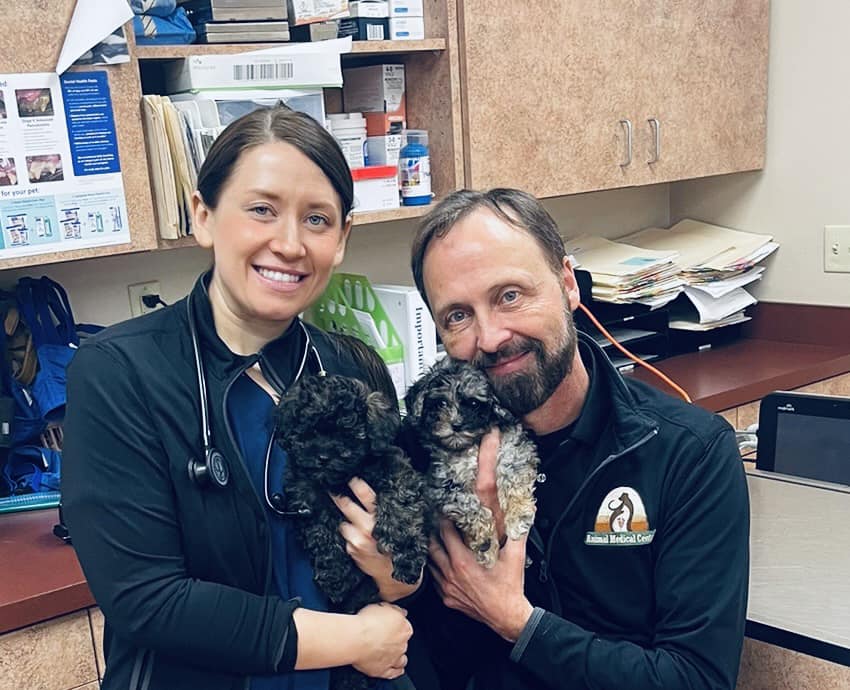
Preventive veterinary care is the cornerstone of keeping your pet their healthiest so that you and your pet can have more great years together. Since pets age more quickly than people do, it is critical to have regular physical examinations done to assess your pet’s health. During routine preventive exams, your veterinarian will assess:
- Overall Body Condition
- Eyes
- Ears
- Nose
- Mouth
- Throat
- Heart and Lungs
- Abdominal Organs
- Musculoskeletal System
- Neurologic System
- Urogenital System
- Lymph Nodes
- Skin/Coat
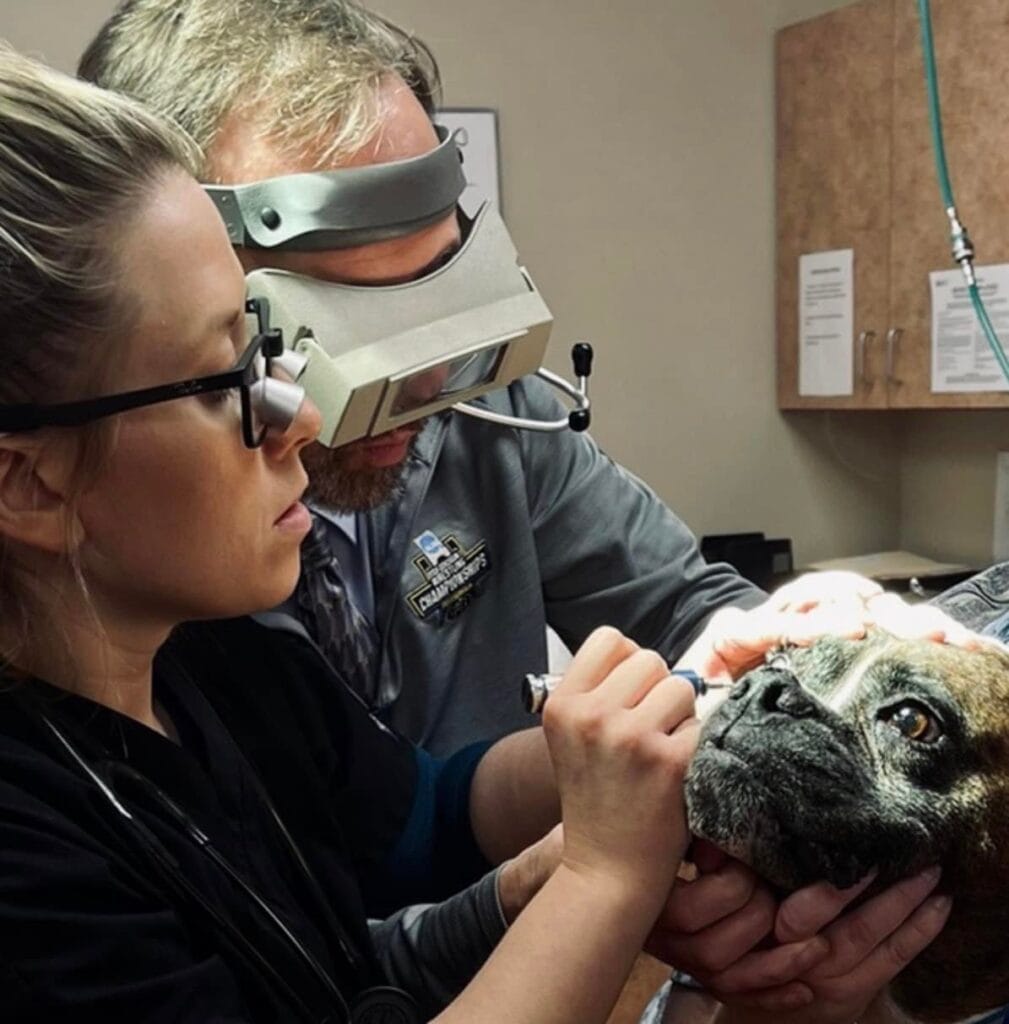
When health problems are identified, a medical plan will be outlined to evaluate the problems in depth. If your pet appears to be healthy enough for routine preventive care, your veterinarian will discuss which immunizations are advised, as well as parasite prevention including heartworm disease, intestinal parasites, and ectoparasites (fleas, ticks, etc.). Annual age-appropriate lab tests, testing for heartworm and/or tick-borne diseases, and fecal tests for parasites may also be recommended for your pet. Finally, your pet’s nutrition, diet, and exercise routines can be assessed and optimized to help your pet be in best physical condition for their lifestyle and age. Remember, keeping up with preventive care for your pet is the best way to keep your pet happy and healthy for life.
We love Senior Pets! Senior pets have special needs, and benefit from more regular veterinary visits compared to their younger counterparts. Age-associated conditions include:
- Arthritis
- Dental Disease
- Heart Disease
- Liver Disease
- Kidney Disease
- Endocrine Disorders
These conditions will start to become more prevalent as your pet gets older. For this reason, we recommend twice-yearly veterinary visits for pets over 7 years of age. Your aging pet may be showing early signs of osteoarthritis such as stiffness after rest or play, difficulty going up or down stairs and reduced activity. Early intervention with joint supplements and prescription arthritis medications when indicated, along with modified nutrition and exercise plans, can greatly improve your pet’s comfort and mobility. Likewise, performing annual screening lab work on your older pet can help identify early stages of medical problems that might go unrecognized, and progress significantly without treatment.
Some pets experience age-related behavioral changes that can be a sign of cognitive dysfunction, which is similar in some ways to dementia. Your veterinarian can recommend diet modification and supplements to help improve your older pet’s mental sharpness. Getting older doesn’t have to be fraught with troubles for your pet… see your vet regularly to help keep your senior pet healthy and comfortable.

Pets are a part of our families, and preventing parasite infestations is an important part of keeping them healthy. Both ectoparasites (external parasites) and endoparasites (internal parasites) can affect your pet at some point in their life. Ectoparasites, such as fleas and ticks, are not only a nuisance to your pet, but can transmit vector-borne diseases to humans and pets such as Bartonella (cat scratch disease, transmitted by fleas); Lyme, Anaplasmosis, Ehrlichia, and Rocky Mountain Spotted fever. Fleas can also cause a severe dermatologic condition for your pet resulting in very itchy, inflamed skin, due to flea allergy dermatitis.
Roundworms are the most prevalent endoparasite in pets. Others include hookworms, whipworms, and tapeworms. Pets are typically infected with these parasites through accidental ingestion of parasite eggs (which are microscopic) from areas that have fecal contamination from other infected animals. Alternatively, some parasites are acquired through ingestion of intermediate hosts such as rodents (Taenia tapeworm species; Toxocara roundworm species) or fleas (Dipyllidium tapeworm species). These parasites are also a health risk to humans and are considered zoonotic – meaning they can be transmitted from animals to people. For example, if a person accidentally ingests roundworm eggs, the larvae can migrate in the body and cause organ damage and potentially blindness. Hookworm larvae in the soil and grass can infect bare skin and cause a condition in people known as cutaneous larval migrans.
Heartworm is another important endoparasite, but one which is not zoonotic. Heartworm infections result from pets being bitten by infected mosquitos. The larval form of the heartworm travels through the bloodstream to the heart where it develops into an adult. The adult heartworms live in the right side of the heart and left untreated, result in progressive heart failure and death. In initial stages of heartworm disease, pets may be asymptomatic. As the condition progresses, symptoms may evolve including a cough and exercise intolerance in dogs, and vomiting/coughing in cats. Treatment of heartworm disease can be very risky for the pet, and very costly.
Because of the health risk to your family and pets, it is important to keep your pet on a year-round parasite prevention program. There are several preventives that when used properly, are very effective at greatly reducing the risk of your pet acquiring heartworm disease, intestinal parasites, and tick transmitted diseases. Additionally, you can help prevent the risk of zoonotic disease to your family by practicing good hygiene (frequent hand washing), avoiding eating unwashed raw vegetables or undercooked meats and cleaning up pet feces in your yard. For more information about pets and parasites, visit petsandparasites.org, and consult with one of our friendly staff!
One of the most common but also frequently overlooked health problems for companion animals is dental disease. By age 3, most pets have some degree of periodontal disease. This occurs as a result of bacterial infection along the gum line, due to the formation of plaque. Plaque is a sticky substance containing millions of bacteria that forms along the tooth surface and gum line. Without frequent removal, plaque eventually hardens into tartar. Left untreated, this leads to gradual destruction of the gum tissue and supportive structures around the teeth, which can result in tooth loss. Not only is periodontal disease harmful and painful because it results in loss of teeth, but it can also cause damage to important vital organs such as the:
- Heart
- Liver
- Lungs
- Kidneys
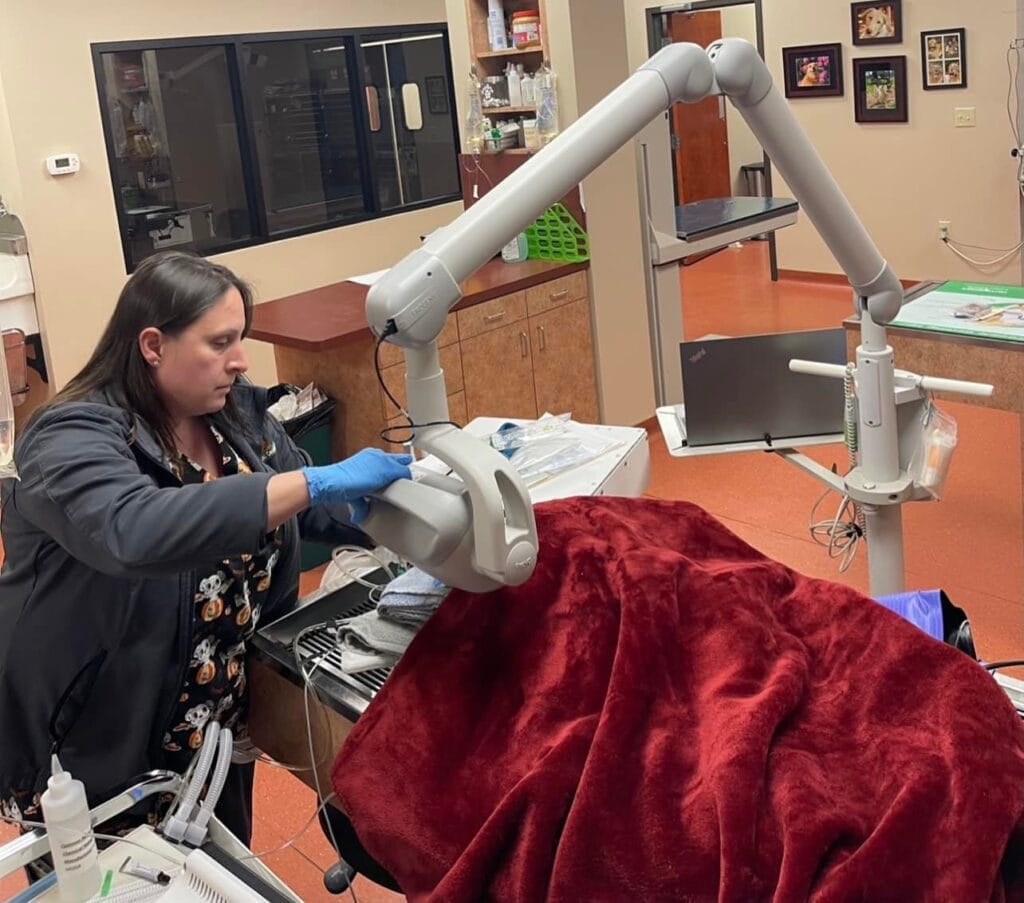
When it comes to dental disease, most pet owners don’t realize the extent of the problem until it is quite advanced; hence the importance of yearly to twice yearly physical examinations including a thorough oral health care assessment. In the early stages of dental disease, your veterinarian can recommend home dental health care measures such as tooth brushing, dental treats and rinses, and dental diets. When professional dental care is needed for your pet, general anesthesia is necessary.
Learn MoreWhen your pet is sick or injured, they can’t tell us what’s wrong. A thorough physical exam and history (symptoms you’ve noted at home) are the first important step. If the diagnosis is not immediately evident upon initial assessment, your veterinarian will recommend specific diagnostic tests. These may include:
- Laboratory testing for baseline blood counts and organ function tests, or infectious disease. Blood and/or urine samples may be collected from your pet, for point-of-care testing, or reference lab tests. Point-of-care tests are those tests that are done on-site in our hospital so as to be able to determine results and make treatment recommendations in the most timely fashion possible. In other cases, lab samples may need to be sent off to off-site laboratories (reference laboratories) – when the test cannot be performed with in-hospital lab equipment, or when the test results are not needed urgently.

- Imaging such as x-rays or ultrasound, which allows diagnosis of conditions of the heart and lungs, gastrointestinal obstruction, tumors of the internal organs or bones, fluid in the chest or abdominal cavity, urinary stones or gallstones, reproductive diseases, and bone/joint disorders. For most patients, gentle restraint can be used for these procedures, however, in some cases, sedation may be necessary.
- Microscopy is quite useful in the evaluation of lab samples such as ear swabs, skin impressions and scrapes, and needle biopsies of tumors. These tests are helpful in diagnosis of dermatologic and otic (ear) conditions.
- Ocular conditions may warrant evaluation for tear production (Schirmer Tear Test), corneal injuries (fluorescein stain), or abnormal intra-ocular pressures (Tonometry).
- Upper gastrointestinal endoscopy, which allows for the diagnosis of gastric and small intestinal disease
Diagnostic testing is an important step in the development of a treatment plan for your pet, allowing your veterinarian to most effectively target the underlying problem(s) and assess the probability of successful treatment. Your veterinarian can explain the purpose of each diagnostic test for your pet, and help prioritize which tests may be most helpful in determining the cause of your pet’s illness.
Does your pet need a scheduled round of vaccinations against communicable diseases? If they’ve never been vaccinated, the answer is “Yes.” If it’s been a while since their last vaccination, they may need additional vaccinations to help them remain protected against disease threats. Unlike mild viral or bacterial infections where your pet can use that initial exposure to build antibodies to fight against future attacks, with diseases that can cause serious illness or even death from the very first encounter, vaccines are necessary. These substances resemble specific disease organisms closely enough that they fool the immune system into creating antibodies against them, even though there is no actual disease threat. We offer a full array of vaccination of dogs and cats to help them stay healthy and safe no matter the situation or stage of life they currently face.
Puppies and kittens typically receive three separate sets of vaccinations over the first 16 weeks of life. Vaccines generally last anywhere from one to three years, after which they lose their potency. That’s why we need to administer booster shots at varying intervals throughout your pet’s life. Our veterinary office provides core vaccinations against rabies, canine distemper, infectious canine hepatitis, canine adenovirus type 2, canine parvovirus, canine parainfluenza, coronavirus, panLeukopenia, calicivirus, rhinotracheitis, feline chlamydia psittaci, and feline leukemia. “Non-core” vaccinations against less common diseases, which we may recommend if your pet’s environment or lifestyle demands it, are repeated every year. Non-core vaccinations may include protection against Leptospirosis, Canine Influenza, Lyme disease, and Bordetella. It is important to remember that in Pennsylvania it is mandatory by law to vaccinate pets against rabies.
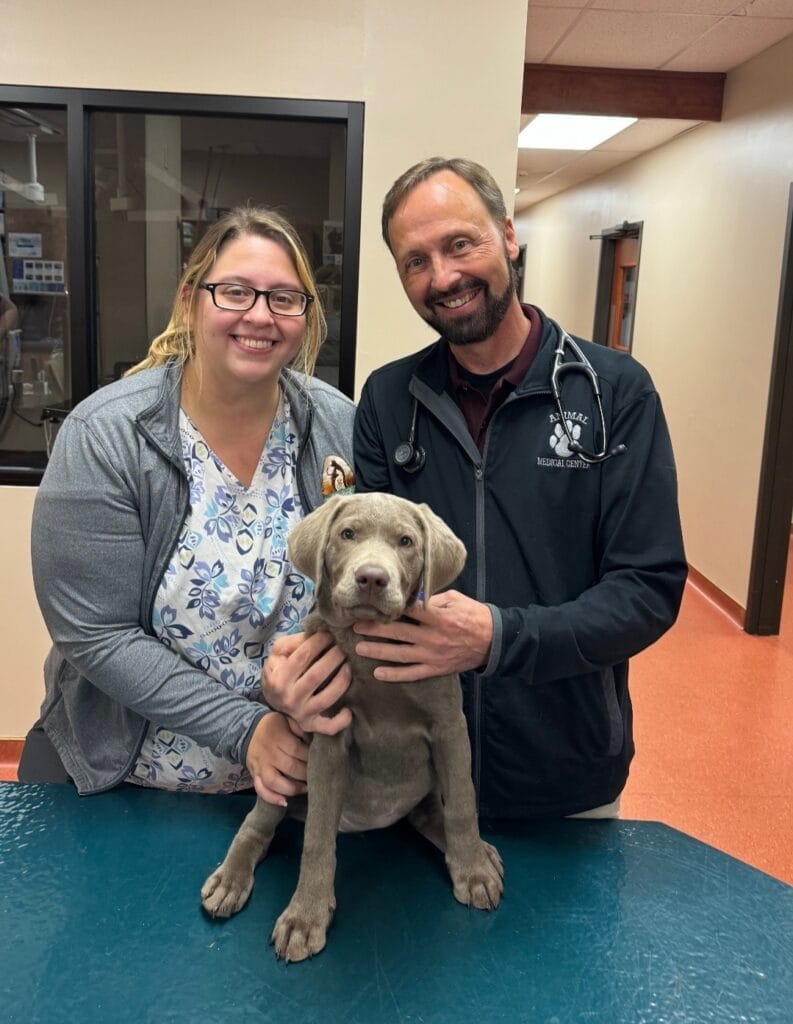
When your pet becomes suddenly ill or in event of an emergency, timely diagnostic test results are extremely important to help your veterinarian determine the best treatment plan. We have state-of-the-art in-hospital laboratory equipment capable of yielding lab results within minutes. Baseline laboratory testing for your sick pet may include:
- Determination of blood cell counts: changes in white blood cell counts, red blood cell counts, and platelet counts can indicate problems such as anemia, dehydration, infection, auto-immune disease, and certain types of cancerous conditions
- Blood chemistry tests: these tests assess liver function, kidney function, blood sugar, blood proteins, calcium and phosphorus levels, and pancreatic function.
- Electrolyte tests: Sodium, potassium and chloride levels may be abnormal when your pet is dehydrated or having fluid losses through vomiting or diarrhea. Intravenous fluids and/or supplementation may be indicated when electrolytes are severely deranged.
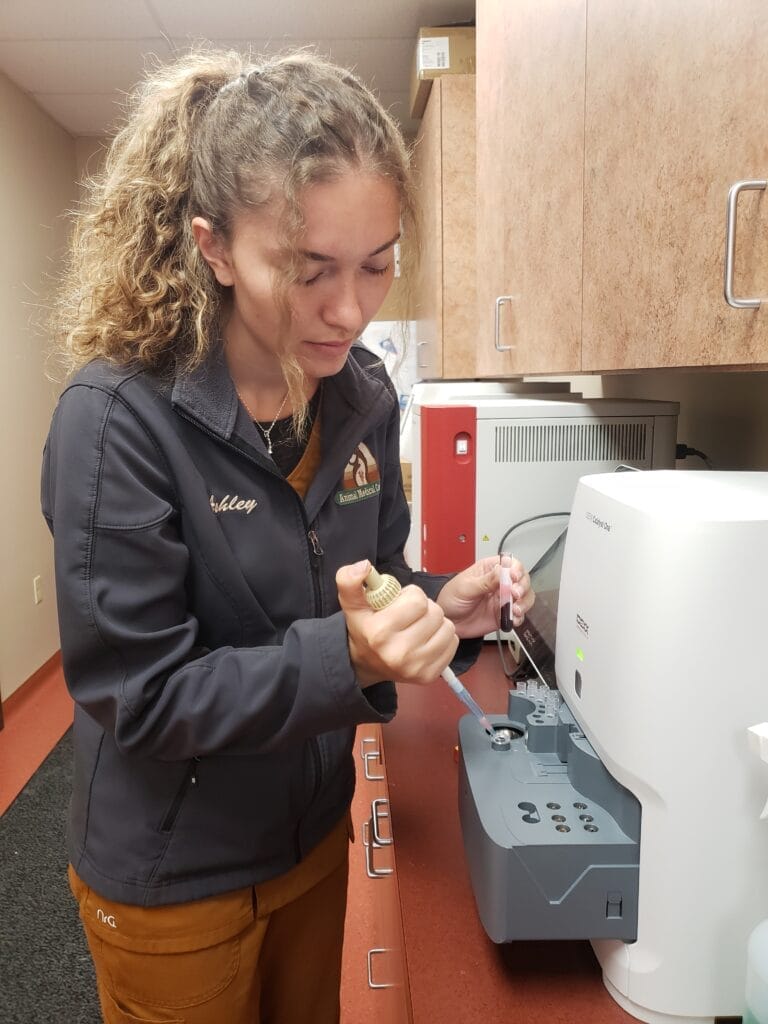
- SNAP tests: point-of-care “snap” tests are available for certain infectious diseases such as Feline Leukemia and Feline Immunodeficiency Virus, Canine Parvovirus, Giardia, and Leptospirosis.
- Coagulation tests: these tests detect deficiency in clotting disorders, which can be present in cases of certain kinds of rodenticide poisoning and in severe liver disease/failure
- Microscopy: microscopic evaluation of bodily fluids including blood, urine; samples of skin and ear secretions, and needle biopsies of swellings or tumors can be performed in-clinic to assist in the diagnosis of systemic diseases, urinary disorders, as well as skin and ear diseases.
Our veterinary team will help explain which tests are most important for your pet. It is very important to us to include you in the decision-making process for your pet, so please don’t hesitate to ask a question if you need clarification.
Pets are the most valuable companions for millions of people and they deserve the best of care. The thought of a beloved pet being in pain is something that every pet owner fears. Our veterinarians at Animal Medical Center of Somerset County are here to help you and your furry friend through any medical issues that may cause pain for your pet.
The Warning Signs
You know your pet better than anyone else. You know when he or she isn’t acting normally but it can still be difficult to determine whether your pet is in pain. We have compiled a few warning signs to keep an eye out for that may indicate your pet is in pain.
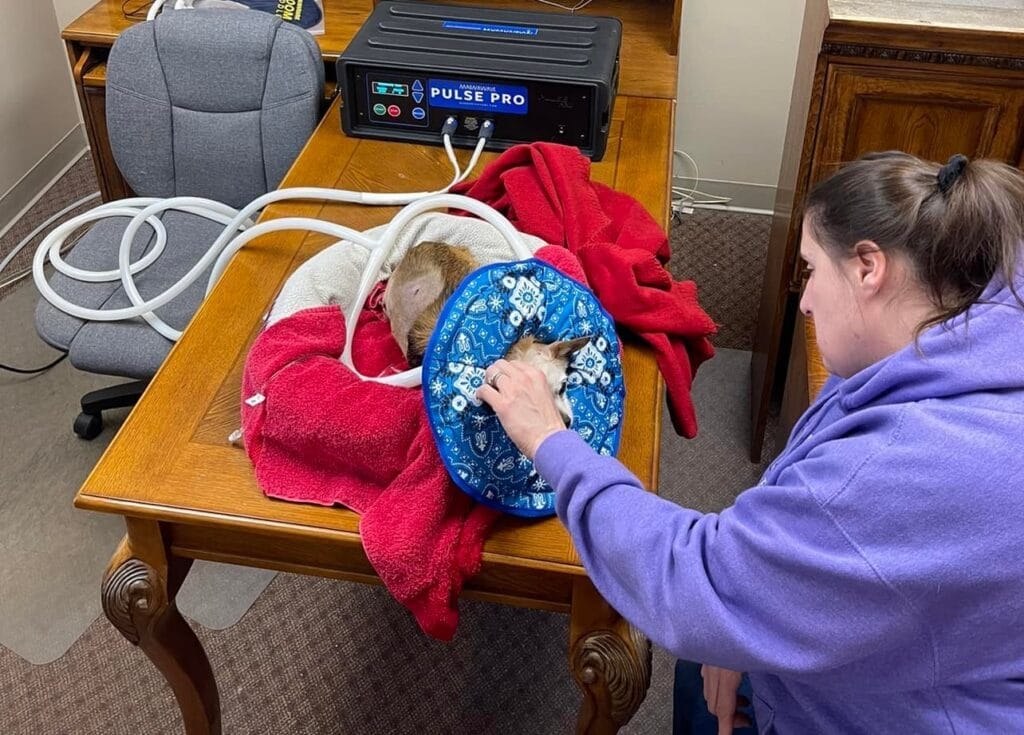
- Whimpering
- Withdrawn and inactive
- Personality change
- Stiffness and limping
- Constant pawing at the ears or head
- Constant licking of a painful area
Anytime you observe any of these behaviors in your pet, you should contact your veterinarian. Our veterinarians are trained and educated on detecting these warning signs and working with you to determine the best treatment option for your pet. Our in-house pharmacy is equipped with various prescription medications, injections, and diets to support your pet’s needs, whilst our online store can ship all those and more directly to your home. We also provide cutting-edge Magnawave therapy – a type of pulsed electromagnetic field (PEMF) therapy that aids in decreasing inflammation within cells, thus reducing pain and inflammation in parts of the body. This can be especially helpful with aiding your pet through sore muscles, wound management, and recovery.
We are dedicated to providing care to your pets at all stages of their lives, including as they cross the rainbow bridge. We’re here to guide you and your family through the various different choices you’ll be presented with, and help accommodate how you wish to handle this difficult process. If bringing your pet home for burial is not how you’d prefer to process this loss, Animal Medical Center offers cremation services through our own small animal exclusive crematory. We provide both a private cremation, in which you’ll receive an urn with your pet’s ashes, and a communal cremation should you decide its best for you to not bring your pet’s remains home. All of our clients, if they so choose, will also be provided with a free paw print and fur keeper keepsake as a physical reminder of their pet to take with them.
We also understand that due to any variety of reasons, an in-clinic procedure may not be the best choice for your family or pet. Our own Dr. Maust understands this, which is why she started her own home euthanasia company: Compassions Home Euthanasia Services. Dr. Maust is dedicated to ensuring your pet has a good quality of life, free of pain, discomfort or fear, including as they make their way across the rainbow bridge. Dr. Maust and Compassions Home Euthanasia Services are honored to help your pet cross in the comfort of their home, and Animal Medical Center is proud to recommend their services. For more information or inquiries regarding home euthanasias, please feel free to visit their Facebook page.
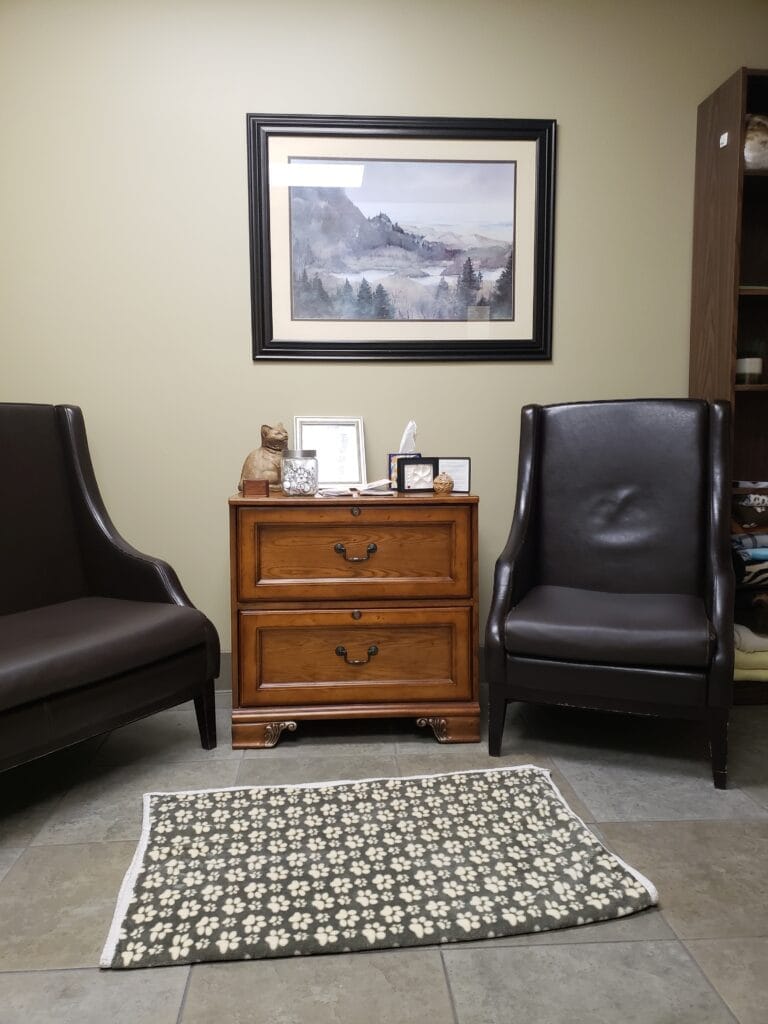
Part of ensuring your pets receive the best care they can is understanding when their particular issue would best be suited for a specialist. Whilst Animal Medical Center provides a plethora of diagnostic and treatment options, there are cases where the work of an opthamologist, cardiologist, orthopedic surgeon, etc. are critical and necessary steps in getting your pet back to feeling its best. This is why our clinic works closely with Blue Pearl of Pittsburgh North (formerly PVSEC). We frequently send referrals for our clients to be seen with them when our veterinarians have determined that their diverse team of specialists, array of specialized surgical and diagnostic equipment, and round-the-clock veterinarian supervision is required for our patients. This 24-7 service is also why we recommend our clients to Blue Pearl in the event of an emergency outside of our own clinic hours, so they can receive immediate care and attention. We’re proud to work with the amazing team at Blue Pearl, and glad to know that our patients will return to Animal Medical Center from their facility having been provided the highest quality care and compassion.
